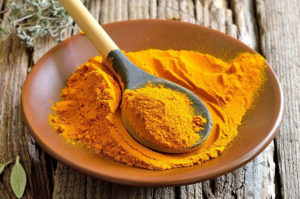
Turmeric has been getting a lot of talk these days. What is it? How does it work? What do the studies say?
Turmeric is a plant related to ginger. It is grown throughout India, other parts of Asia and Central America. Turmeric is a common spice and a major ingredient in curry powder. Its active ingredient is curcumin.
Research has shown that there are low rates of certain types of cancer in countries where people eat curcumin at levels of 100mg to 200mg a day over long periods of time. There is NO conclusive evidence that turmeric or curcumin can prevent or treat cancer.
Anti-Inflammatory and Anti-Cancer Activities
Recent evidence that curcumin may have anti-inflammatory and anticancer activities has renewed scientific interest in it’s potential to prevent and treat disease. A recent phase 2 trial combining prednisone and curcumin was carried out in 26 patients with prostate cancer. The level of prostate-specific antigen (PSA) decreased in most patients and was normalized in 36% of them.
Something to note here is the size of the study. This seems to be an ongoing theme with studies concerning turmeric regarding its therapeutic uses. In fact, in preparation for this article I couldn’t find any studies that were bigger than 300 subjects and almost all the articles I found at the end stated that more extensive studies needed to be done.
A preliminary intervention trial that compared curcumin with a nonsteroidal anti-inflammatory drug (NSAID) in 18 patients with rheumatoid arthritis (RA) found improvements in morning stiffness, walking time and joint swelling after 2 weeks of supplementation with curcumin. Similar results were found when the subjects used 300 mg/day of an NSAID.
Although previous studies have proven inconclusive a recent study published in Jan 2018 in the American Journal of Geriatric Psychiatry examined the effects of a curcumin supplement on memory performance in people without dementia as well as the impact it has on the brains of people with Alzheimer’s. It should be noted that senior citizens in India, where curcumin is a staple of their diet, have a low prevalence of Alzheimer’s and better cognitive performance.
Dr Gary Small, director of geriatric psychiatry at UCLA’s Longevity Center stated, “Exactly how curcumin exerts its effects is not certain, but it may be due to its ability to reduce brain inflammation, which has been linked to both Alzheimer’s disease and major depression.”
A study involving 40 adults between the ages of 50 and 90 years who had mild memory complaints received standardized cognitive tests at the start of the study and at 6-month intervals. Their curcumin levels were also monitored at the start of the study and after 18 months.
The people who took curcumin experienced significant improvements in their memory and attention abilities, while those who took the placebo did not. In memory tests the people who took the curcumin improved by 28 percent over 18 months.
As always. Buyer beware. Curcumin shows great promise as a super anti-inflammatory which can have very positive effects for those with joint problems or memory loss, according to the small amount of scientific data we have. But more work needs to be done before anyone can call it a cure or even a strong prevention strategy. As far as side effects turmeric in amounts used for health purposes is considered safe. But high doses or long-term use of turmeric may cause gastrointestinal problems.
So……What’s for dinner???